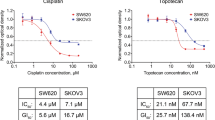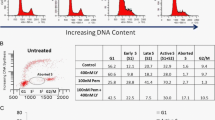Summary
To analyze the discrepancy between the in vitro response in the clonogenic assay and the clinical response, the time-schedule dependencies of various anticancer drugs were determined by comparing the inhibiting effect against colony formation by PC-7 cells treated with the drugs for 1 h with that of those treated for 24h. According to their schedule dependency the drugs can be divided into a schedule-dependent drug group (5-fluorouracil, methotrexate, bleomycin, pepleomycin, etoposide, cisplatin, teniposide, vindesine, and vinblastine) and a non-schedule-dependent drug group (adriamycin, actinomycin D, ranomustine, mitomycin C, aclacinomycin, daunomycin, nimustine, melphalan, and KW 2083). In the clonogenic assay, the 1-h exposure schedule is appropriate for predicting clinical response for the non-schedule-dependent drugs. However, the effect of the schedule-dependent drugs was underestimated in the same conditions. Therefore, it is necessary to test these drugs in the assay by 24-h exposure for a more accurate assessment of their antitumor activity.
Similar content being viewed by others
References
Drewinko B, Gottlieb JA (1975) Action of cis-dichlorodiamine-platinum (II) (NSC-119875) at the cellular level. Cancer Chemother Rep 59:665
Fischer GA, Sartorelli AC (1964) Development, maintenance and assay of drug resistance. Methods Med Res 10:247
Greenberg BR, Salmon SE (1984) Human tumor clonogenic assay in patients with unknown primary carcinomas. J Clin Oncol 2:46
Grieder A, Maurer R, Stahelin H (1974) Effect of an epipodophyllotoxin derivative (VP-16-213) on macromolecular synthesis and mitosis in mastocytoma cells in vitro. Cancer Res 34:1788
Hamburger AW, Salmon SE (1977) Primary bioassay of human tumor stem cells. Science 197:461
Hamburger AW, Salmon SE, Kim MB, Trent JM, Soehnlen BJ, Alberts DS, Schmidt HJ (1978) Direct cloning of human ovarian carcinoma cells in agar. Cancer Res 38:3438
Johnson PA, Rossof AH (1983) The role of the human tumor stem cell assay in medical oncology. Arch Intern Med 143:111
Kanzawa F, Hoshi A, Kuretani K (1980) Mechanism of cytotoxicity of 5-fluorouracil: Distinction between the irreversible cytotoxic effect of 5-fluorouridine and the reversible cytotoxic effect of 5-fluoro-2′-deoxyuridine on murine lymphoma L5178Y cells in culture. J Cancer Res Clin Oncol 98:85
Kanzawa F, Hoshi A, Shimizu E, Saijo N, Miyazawa N, Shimabukuro Z (1984) Clonogenic cell assay for carcinoma of the lung. Gan 75:81
Kitten CM, Von Hoff DD, Bennett EV Jr, Trinkle JK, Grover FL (1983) The human tumor clonogenic assay in the treatment of patients with lung cancer. Ann Thorac Surg 36:408
Ludwig R, Alberts DS, Miller TP, Salmon SE (1984) Evaluation of anticancer drug schedule dependency using an in vitro human tumor clonogenic assay. Cancer Chemother Pharmacol 12:135
Rosenblum ML, Dougherty DV, Deen DF, Wilson CB (1981) Potentials and limitations of a clonogenic cell assay for human brain tumors. Cancer Treat Rep (Suppl) 65:61
Rupniak HT, Whelan RDH, Hill BT (1983) Concentration and time-dependent inter-relationships for antitumor drug cytotoxicities against tumour cells in vitro. Int J Cancer 32:7
Salmon SE (1984) Human tumor colony assay and chemosensitivity testing. Cancer Treat Rep 68:117
Shimoyama M (1975) Cytocidal action of anticancer agents: Evaluation of the sensitivity of cultured animal and human cancer cells. In: Ito Y, Dutcher RM (eds) Comparative leukemia research 1973. Leukemogenesis. University Press, Tokyo; Karger, Basel, p 117
Van Putten LM (1974) Are cell kinetic data relevant for the design of tumour chemotherapy schedules? Cell Tissue Kinet 7:493
Von Hoff DD, Casper JT, Bradley E, Sandbach J, Jones D, Makuch R (1981) Association between human tumor colony-forming assay results and response of an individual patient's tumor to chemotherapy. Am J Med 70:1027
Von Hoff DD, Clark GM, Stogdill BJ, Sarosdy MF, O'Brien MT, Casper JT, Mattox DE, Page CP, Cruz AB, Sandbach JF (1983) Prospective clinical trial of a human tumor cloning system. Cancer Res 43:1926
Author information
Authors and Affiliations
Rights and permissions
About this article
Cite this article
Matsushima, Y., Kanzawa, F., Hoshi, A. et al. Time-schedule dependency of the inhibiting activity of various anticancer drugs in the clonogenic assay. Cancer Chemother. Pharmacol. 14, 104–107 (1985). https://doi.org/10.1007/BF00434345
Received:
Accepted:
Issue Date:
DOI: https://doi.org/10.1007/BF00434345




